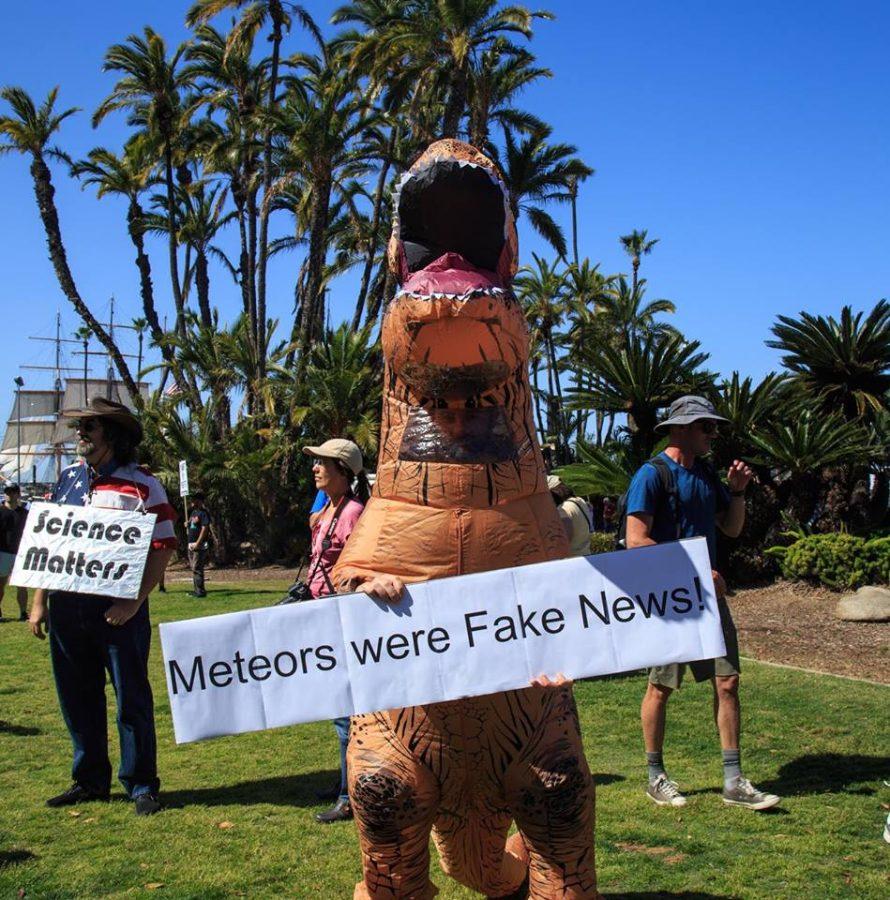The annual San Diego Rally for Science was held on May 4 at Waterfront Park to connect the San Diegan public to the scientific community. The rally included town hall-style panels on public health and vaccinations, climate change solutions, and citizen science, as well as a Science Expo composed of various local organizations that focus on science and politics.
The March for Science was first held in April 2017 in cities around the world as a protest to US President Donald Trump. The respective march in San Diego garnered over 15,000 people to attend during their first year. However, that number has dropped precipitously since then, where the 2019 rally only had a couple hundred of attendees.
The CEO of San Diego for Science, Robert Cooper, told the UCSD Guardian that the goal of the event was to help combat international problems like climate change and disease, by spreading awareness of current scientific achievements. According to Cooper, the event displayed how current research can benefit everyone’s daily lives, as well as how regular citizens can support science-based governmental policy.
“Support for science should be a universal American value,” Cooper said. “We want to change the culture so that science is more valued and that people would understand its importance and feel better connected to it. That sets the stage for policymakers to incorporate science more in their decision making because their constituents care.”
Public health and immunization was the first panel of the Town Hall, where three doctors discussed the benefits and the growing public misunderstanding of vaccinations. The panelists explained how vaccinations had little to no risk for recipients and have exponentially greater advantages for the recipients and their communities. Dr. Richard Armenta from California State University, San Marcos elaborated on the misinformation of vaccinations.
“People are more likely to latch onto information they are familiar with, whether that’s from social media, or things they’ve heard from community members,” Dr. Armenta said on the panel. “If the general public doesn’t understand the science and we don’t have an open conversation about their hesitancy and other barriers like transportation, clinic [availability] or access to education, then we aren’t going to be effectively treating and caring for different communities and giving them the opportunity to protect their own health.”
The following panel on climate change solutions elaborated on possible ways in which individuals and the nation can combat the issue. The speakers brought up how renewable energy and its plethora of sources — nuclear, wind, solar, or hydroelectric — must be discussed in terms of safety, sustainability, and effectiveness.
There was also debate between the effectiveness of actions by individuals in their daily lives as compared with policy action. Some of the panelists, like Dr. Francesca Turco from Columbia University, DIII-D National Fusion Facility, believes that enacting small changes, like becoming vegan, does help the environment, but only amounts to a tiny change. Dr. Ryan Vaughan, a board-member of Surfrider San Diego, concurs and believes that policy action is better.
“Standing out in front of a headquarter and shouting is probably not your best play,” Dr. Vaughan said on the panel. “Getting policies in place that force companies to deal with the consequences of their actions is very well played.”
He adds that there needs to be more transparency regarding how companies use their money. One suggestion Dr. Vaughan proposes is to read into Michael Bloomberg’s Task Force for Climate-Related Financial Disclosure.
“Things like the TCFD wants to make major companies, especially financial institutions, disclose the climate risks they [cause] based on their portfolio and where they put their investments,” Dr. Vaughan continued. “We need to drive companies to [assume responsibility] on what they’re doing.”
In addition to the Town Hall panels, the rally had various organizations as a part of the Science Expo. Groups like Fleet Science, 500 Women for Science, the Salk Institute and Girl Next Door Honey showed how regular citizens can be a part of the scientific process.
“We want to let people know that science is approachable,” Director of Education Outreach at the Salk Institute Dona Mapston said. “Our goal with education outreach is that we want to present science as not this mystery box, but that it’s something everybody can appreciate and that it’s important in everybody’s everyday lives. It is critical that everyone is involved in understanding the science that is in the world around them.”
Other organizations took a more political approach to advocate for sound science in politics. Groups like Represent Us built their platform on the premise that money in politics has a negative impact on many aspects of American society. Their representative Amy Tobia believes that money in politics is in part causal to the politicization of science.
“One of the biggest issues [money in politics] is having is on the scientific community,” Tobia said. “When people politicize scientific research, then they can’t move us forward as a country. We’re here today to bring awareness for our work in getting money out of politics as well as to support the [Rally] for Science. We believe that the work they’re doing in advocacy is great.”
The event marks the third year that San Diego for Science has hosted the Rally for Science. The event has become a platform to advocate for research-based science and to connect regular citizens to the scientific community. Cooper hopes that the event will foster greater consideration for science in the public as well as the political sphere.
No UC San Diego department or organization was present as part of the Expo. However, UCSD professor Scott Klemmer was a speaker on the citizen science panel.
Photo courtesy of San Diego for Science.








